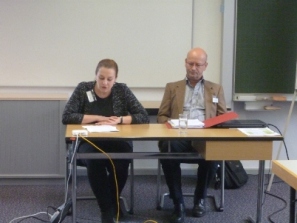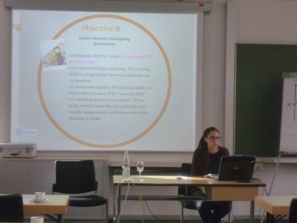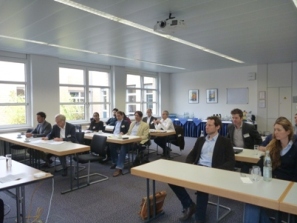The Foundation for the Rights of Future Generations (FRFG) and the Intergenerational Foundation (IF) award the Demography Prize, endowed with €10,000, to essayists who address political and demographic themes relevant to the field of intergenerational justice. The prize was initiated and is funded by the Stiftung Apfelbaum. Through the prize, FRFG and IF aim to promote a discussion of intergenerational justice in society, and, by providing a scientific basis to the debate, establish new perspectives for decision-makers. The call for papers is intended to target young scholars of different disciplines. Entries should range from 20 to 40 pages in length.
For 2012/2013 entries, the awarding consortium called for papers on the following topic:
“Youth Quotas — The Answer to Changes in Age Demographics?”
The following text will provide some first ideas for a submission:
Demographic change in many developed and developing countries means an ageing population. In the UK in 2050, government statisticians predict that there will be 2.5 times as many people aged 85 and over as there are today. The number of people aged between 16 and 64 is predicted to fall from 65 per cent to 59 per cent. Similar trends have been observed throughout Europe.
An ageing population has a number of significant intergenerational implications for voter power and political representation. Is it possible that youth will find it increasingly difficult to exercise power through the ballot box? Will our democracies become gerontocracies?
One way to counterbalance the trend and ensure the young do not become sidelined could be the introduction of youth quotas.
Although submissions can treat both, there is a difference between “youth quotas” and “youth representation in decision-making”. While the first stipulates that a certain percentage of young people must be included in a panel or body, the second generally prescribes one seat for young people. Above all, the latter applies to committees, panels and bodies in which all societal groups are represented.
Almost nothing about youth quotas can be found on Wikipedia or by searching the web with Google. It appears to be a brand new topic: this means that addressing it could be very innovative, or is the fact that almost nobody has promoted it a sign of its irrelevance?
Many interdisciplinary questions are raised in the context of the youth quotas debate: for political scientists it may be interesting to examine whether democratic principles would be violated when young representatives are voted into a parliament, even if they are clearly less popular than their older opponents. And would quota regulation ensure that young people have sufficient power to influence political decision-making?
From a legal point of view it should be considered whether the implementation of youth quotas is consistent with national and European legal principles. Are there any examples from, for example, the implementation of quotas for women and ethnic groups that demonstrate the potential legal challenges of implementing youth quotas?
With regards to philosophyit might be interesting to investigate whether it is necessary for parliaments to reflect the demographic make-up of societies to be just. Is the implementation of youth quotas a fair method to ensure that young people are represented?
Finally, sociologists could examine and regard youth quotas in the context of the controversial subject of “affirmative action”. This policy may address the problem statistically, but would young people in powerful societal positions be taken seriously? Could the promotion of youth quotas initiate an important societal change that benefits and empowers young people?
The promotion of youth quotas and youth representation in decision-making could initiate an important societal change. As organisations whose mission is to promote justice and fairness between generations, IF and FRFG would like to generate a fruitful debate in this area, with a focus on the empowerment of young people in politics and society.
The deadline for submitted papers was July 1st, 2013.
Recommended Literature:
Alemann, Ulrich von, Martin Morlok and Thelse Godewerth (2006): Jugend und Politik. Möglichkeiten und Grenzen politischer Beteiligung der Jugend. Baden-Baden: Nomos.
Baltrunaite, Audinga, Piera Bello, Alessandra Casarico and Paola Profeta (2012):“Gender Quotas and the Quality of Politicians”, CESifo working paper No. 3734, Munich: University, Centre for Economic Studies. Available online:
https://www.cesifo-group.de/portal/pls/portal/docs/1/1215280.PDF
Bengtson, Vern L. (1993): “Is the ‘Contract Across Generations’ Changing? Effects of Population Aging on Obligations and Expectations Across Age Groups”, in: Vern L. Bengtson and W. Andrew Achenbaum (eds): The Changing Contract Across Generations. New York: de Gruyter, pp. 3–24.
Binstock, Robert H., and J. Quadagno (eds) (2001): “Aging and politics”, in: “Older people and voting participation: Past and future”, in: Robert H. Binstock and Linda K. George (eds): Handbook of aging and the social sciences, 5th edn. San Diego: Academic Press, pp.333–51.
Castles, Francis G. (2008): “What welfare states do: A disaggregated expenditure approach”, in: Journal of Social Polic, 38 (1), pp.45–62.
Dahlerup, Drude (2003): “Quotas are Changing the History of Women. The Implementation of Quotas: African Experiences”. Available online: https://www.quotaproject.org/cs/cs_drude_africa_oct_2004.pdf
Dahlerup, Drude, and Lenita Freidenvall (2005): “Quotas as a ‘fast track’ to equal representation for women. Why Scandinavia is no longer the model”, in: International Feminist Journal of Politics, 7/1, pp. 26–48.
Disney, Richard (2007): “Population ageing and the size of the welfare state: Is there a puzzle to explain?” in: European Journal of Political Economy, 23(2): pp. 542–553.
Donovan, Barbara (2007): “ ‘Minority’ Representation in Germany”, in: German Politics, 16/4, pp. 455–80.
Engelstad, Fredrik (2012): Firms, Boards and Gender Quotas: Comparative Perspectives. Bingley: Emerald Group.
Esping-Andersen, Gosta, and Sebastian Sarasa (2002): “The generational conflict reconsidered”, in: Journal of European Social Policy, 12 (1), pp. 5–21.
Faulkner, Kathryn M. (2009): “Presentation and Representation. Youth participation in ongoing public decision-making projects”, in: Childhood, 16/1, pp. 89–104.
Gabriel, Jeus-Peter (1988): “Quotenregelung – nur ein verfassungsrechtliches Problem?”, in: Gegenwartskunde, 37/4, pp. 501–509.
Hanley, Seán (2012): “Explaining the Success of Pensioners‘ Parties: a Qualitative Comparative Analysis of 31 polities”, in: Pieter Vanhuysse and Achim Goerres (eds.): Ageing Populations in Post-industrial Democracies. London/New York/ Berlin/Heidelberg: Springer Verlag, pp. 23–53.
Hanley, Seán (2010): “The Emergence of Pensioners’ Parties in Contemporary Europe”, in: Joerg C. Tremmel (ed.): A Young Generation Under Pressure? Financial situation and ‘rush hour of life’ of the cohorts 1970–1985 in a generational comparison. Berlin/Heidelberg: Springer Verlag, pp. 225–247.
Kates, Michael (2011): “Justice, Democracy, and Future Generations”, APSA 2011 Annual Meeting Paper. Available online: https://ssrn.com/abstract=1902452
Kohli, Martin, Sighard Neckel and Jürgen Wolf (1999): “Krieg der Generationen? Die politische Macht der Älteren” in: Annette Niederfranke, Gerhard Naegele and Eckart Frahm (eds): Funkkolleg Altern, vol. 2. Opladen: Westdeutscher Verlag, pp.479–514.
Kotlikoff, Laurence J., and Scott Burns (2004): The Coming Generational Storm.Cambridge: MIT Press.
Kotlikoff, Laurence J., and Scott Burns (2012): The Clash of Generations: Saving Ourselves, Our Kids, and Our Economy. Cambridge: MIT Press.
Laux, Annika (2011): Was wünschen sich die Mitglieder von ihren Parteien?, in: Tim Spier et. al (eds): Parteimitglieder in Deutschland. Wiesbaden, pp. 157–76.
Leif, Thomas (2010): Angepasst und ausgebrannt: Die Parteien in der Nachwuchsfalle. Warum Deutschland der Stillstand droht. Munich: Goldmann.
Lynch, Julia (2006): Age in the Welfare State. The Origins of Social Spending on Pensioners, Workers, and Children. Cambridge/New York: Cambridge University Press.
Nanivadekar, Medha (2006): “Are Quotas a Good Idea? The Indian Experience with Reserved Seats for Women”, in: Politics & Gender, 02/1, pp. 119–128.
Tepe, Markus / Vanhuysse, Pieter (2012): Accelerating Smaller Cutbacks to Delay Larger Ones? The Politics of Timing and Alarm Bells in OECD Pension Generosity Retrenchment. In: Vanhuysse, Pieter / Goerres, Achim (eds.): Ageing Populations in Post-industrial Democracies.London/New York: Berlin/Heidelberg: Springer Verlag, pp. 127–144.
Vanhuysse, Pieter, and Achim Goerres (2012): “Mapping the Field: Generational Politics and Policies in Ageing Democraties”, in: Pieter Vanhuysse and Achim Goerres (eds.): Ageing Populations in Post-industrial Democracies. London/New York/Berlin/Heidelberg: Springer Verlag, pp. 1–22.
Wiesendahl, Elmar (2001): “Keine Lust mehr auf Parteien. Zur Abwendung Jugendlicher von den Parteien”, in: Aus Politik und Zeitgeschichte, B 10/2001, pp. 7–19.
Wilkoszewski, Harald (2003): Die verdrängte Generation. Politische Parteien und die alternde Gesellschaft in Deutschland. Marburg: Tectum Verlag.
Wilkoszewski, Harald (2010): “Alte versus Junge”, in: Manuela Glaab, Werner Weidenfeld and Michael Weigl (eds): Deutsche Kontraste 1990–2010. Politik – Wirtschaft – Gesellschaft – Kultur. Frankfurt: Campus, pp. 355–85.
The following papers were awarded by the jury:
1st Prize: Juliana Bidadanure: “Better Procedures For Fairer Outcomes: Are Youth Quotas Required by Intergenerational Justice?” (PDF)
2nd Prize: Fatema Jahan: “Youth Quotas and Youth-i-zation Or Youth Leadership and Youth Movement? — A response to age demographics” (PDF)
Two 3rd Prizes: Tobias Hainz: “Sind Jugendquoten eine Form der Altersdiskriminierung?”(PDF) and Elias Naumann, Moritz Heß & Leander Steinkopf: ““Der Generationenkonflikt in Europa. Die Jugendquote: von den Europäern gewollt?” (PDF)
Academic Symposium on “Youth Quotas — The Answer to Changes in Age Demographics?”
25/26 October 2013, Stuttgart (Germany)
 The aim of the academic symposium was to give an answer to the question whether “Youth Quotas” provide a solution to changes in age demographics and a looming gerontocracy. Based on the premise that young people have the potential to act as change agents, especially with regard to ecological sustainability, it was our aim to stimulate a societal discussion and to raise public awareness on the topic of “Youth Quotas”, whilst providing the discussion with a scientific basis.
The aim of the academic symposium was to give an answer to the question whether “Youth Quotas” provide a solution to changes in age demographics and a looming gerontocracy. Based on the premise that young people have the potential to act as change agents, especially with regard to ecological sustainability, it was our aim to stimulate a societal discussion and to raise public awareness on the topic of “Youth Quotas”, whilst providing the discussion with a scientific basis.
The question of a power shift between generations is already discussed in many facets in the literature. Many commentators state that a shift is already visible and that the problem requires careful political management. In this sense, the implementation of youth quotas could be a possible method of protecting the interests of younger generations in politics and beyond in light of the purported power shift. The symposium investigated a topic that is greatly under-researched.
Some key questions to be addressed at the symposium were: Should “Youth Quotas” be limited to the political arena (political parties, parliaments, etc.) or should they also be implemented in other fields (economy, companies, associations, organizations, etc.)? Can “Youth Quotas” ensure that an additional sense of urgency is included in the problem-solving process of future problems like global warming? Will young people really represent the interests of the young generation as a whole, or will they just follow their own individual interests? Are “Youth Quotas” in general an effective instrument to strengthen the rights of the young generation or do we need other and more effective instruments?
 It was contested whether or not “Youth Quotas” are an effective means to strengthen the rights of following generations. Some junior scientists suggested that young people can be thought of as the “trustees of posterity” as they tend to be fiercer defenders of long-termist policies since the environmental crisis will have a more concrete impact on their lifespan.
It was contested whether or not “Youth Quotas” are an effective means to strengthen the rights of following generations. Some junior scientists suggested that young people can be thought of as the “trustees of posterity” as they tend to be fiercer defenders of long-termist policies since the environmental crisis will have a more concrete impact on their lifespan.
But other speakers rejected the causality that young people will have a stronger determination to solve future problems, and that they will add a new “young” perspective in the epistemic process of finding solutions to future problems. The indication by these speakers was that environmental issues are not the top priority of young people.
Regarding the composition of party lists, one speaker pointed to the problem of legitimacy of the outcome of an election. The positive discrimination of youth within a societal group has to be justified because other groups could feel disadvantaged by the implementation of such a strong instrument. Some speakers challenged the analogy of “Youth Quotas” to quotas for women or ethnic minorities, because women and ethnic minorities can’t change their status whereas today’s young people, in the normal course of life, will be the old people in the future. This means that the disadvantage of a person in his or her young age is just temporal. Generational effects were pitted against age effects in this context.
 Some experts pointed to alternatives to “Youth Quotas”. Lowering the voting age and better political education in schools, especially, would produce better results according to their view. Another strategy was seen in the implementation of proxy votes for the parents.
Some experts pointed to alternatives to “Youth Quotas”. Lowering the voting age and better political education in schools, especially, would produce better results according to their view. Another strategy was seen in the implementation of proxy votes for the parents.
A vote at the end of the symposium showed interesting results: Although several problems were noted, most of the speakers voted for the implementation of “Youth Quotas”. All speakers voted for lowering the voting age. The conclusion reached by the academic symposium is that a package of measures is required, to give adequate answers to demographic change. “Youth Quotas” could be part of this package.
For more information see the description of the scientific content and the conference program.
The Symposium was supported by the Stiftung Apfelbaum , The Fritz Thyssen Stiftung and ENRI-Future.



